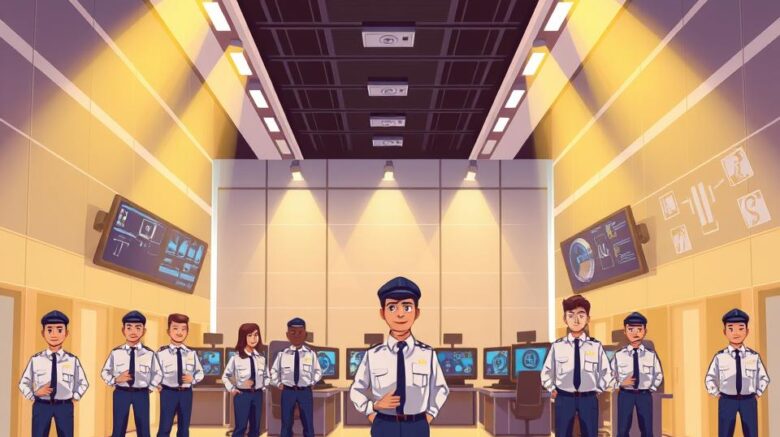Optimizing Protection with Hospital Security Guards
Did you know that hospitals face an average of 30 violent incidents daily? This startling data emphasizes how vital Hospital Security Guards are. They protect not just patients but also staff and confidential information. Within the ever-changing healthcare environment, effective Healthcare Facility Security is critical. It involves establishing secure environments where patients receive care free from violence or privacy risks.
Working closely with seasoned providers like Divine Protection Services boosts Medical Center Security Services. This ensures safety is always a top priority, without sacrificing access. This guide looks at how commercial property patrol approaches and monitoring tools can markedly upgrade safety measures. It addresses both inside and outside dangers efficiently.

Significant Points
- Hospital Security Guards are essential for safeguarding patients, personnel, and confidential information.
- Healthcare Facility Security is vital to reduce violent episodes and protect privacy.
- Integrated security solutions amplify the overall performance of hospital security services.
- Aligning with organizations like Divine Protection Services provides bespoke security solutions.
- Cutting-edge technologies underpin contemporary healthcare security strategies.
- Juxtaposing access and confidentiality is essential for robust hospital safety protocols.
The Critical Role of Hospital Security
Hospital security is paramount for the well-being of patients and staff and the defense of sensitive data. The uptick in violent incidents in hospitals demonstrates the demand for capable Hospital Security Guards. These guards are essential for maintaining a safe environment and upholding the rights and dignity of everyone.
Executing strong Healthcare Facility Security approaches is essential to avoid aggression. This helps in creating a compassionate environment, improving the patient and family experience. It additionally secures conformity with rules such as HIPAA, enforcing secure access to safeguard Protected Health Information (PHI). Such measures not only safeguard patients but also foster trust between healthcare providers and their communities.
| Category of Security Intervention | Significance | Adherence to Rules |
|---|---|---|
| Access Control Systems | Restrict unauthorized entry and access | Vital for meeting HIPAA requirements |
| Surveillance Cameras | Monitor activities and deter criminal behavior | Supports regulatory requirements for safety |
| Emergency Response Plans | Provide quick responses to incidents | Compliant with safety and emergency management guidelines |
| Training for Security Personnel | Train employees in crisis response skills | Meets required safety and security norms |
Investing in robust security measures and training for personnel is essential for protecting hospitals and healthcare settings. These procedures create a secure and regulation-adherent space, crucial for providing excellent patient care.
Role of Hospital Security Guards
Hospital security personnel perform a critical role in safeguarding hospitals. They monitor access points to stop unauthorized entry, handle emergencies, and use conflict resolution to prevent threats. After receiving instruction from Divine Protection Services, they detect and handle signs of aggression or unrest.
Their presence is key to the safety and well-being of patients and staff. They safeguard the hospital’s functions, vital for a therapeutic atmosphere. By providing protection, they boost patient satisfaction and decrease threats.
Advanced Technologies in Hospital Security
Today’s medical centers are progressively using Advanced Technologies to reinforce their security protocols. Medical Center Security Services skillfully combine technologies such as AI-enabled cameras to boost monitoring functions. Such cameras provide live tracking and analytics, allowing teams to detect and address risks promptly.
A fundamental part of Healthcare Security Solutions is utilizing access control systems. Such systems limit entry to protected areas, guaranteeing that only permitted individuals enter vital sections. By employing biometric authentication, hospitals can add an extra layer of security to patient information and valuable medical equipment.
AI-based security tools serve a critical function in physical protection. Face recognition and behavior analysis allow security teams to react quickly to security incidents. Enhanced video analytics underpin strategic decisions, ensuring uninterrupted surveillance of medical facilities. This cultivates a secure space for personnel and patients.
| Innovation | Use Case | Gains |
|---|---|---|
| AI-driven Surveillance | Live tracking | Quick risk detection |
| Access Control Systems | Restricted entry | Securing critical zones |
| Facial Recognition | Personal identification | Preventing unauthorized access |
| Video Analytics | Surveillance management | Informed operational choices |
Leading Technologies do more than guard hospital resources—they also build a protected atmosphere for all. By adopting these state-of-the-art technologies, hospitals can stay watchful for security hazards. This secures quality care delivery for patients.
Healthcare Security Methods
Successful Healthcare Facility Security plans are critical to protect patients, employees, and guests in hospitals. Performing comprehensive risk evaluations is the foundation of these plans. By pinpointing weaknesses, hospitals can develop tailored protocols for diverse situations. This boosts their readiness for any incidents that may occur.
It’s essential to urge the reporting of irregular conduct and risks. Healthcare facilities must have systems ready to respond quickly to such reports. This forward-thinking approach in Healthcare Facility Security fosters a culture of collective safety.
Managing visitors is a key component of Medical Center Security Services. Confirming that only sanctioned people enter maintains a secure atmosphere. Supervising patient-provider interactions additionally lessens dangers. This makes the space safer for everyone. Presented below is a table detailing the main elements of successful security strategies.
| Security Element | Explanation | Outcomes |
|---|---|---|
| Risk Assessments | Uncovering vulnerabilities and gauging potential threats. | Enhances readiness and reaction speed. |
| Incident Reporting | Motivating staff and visitors to flag unusual behavior. | Enables swift threat responses and heightens vigilance. |
| Visitor Management | Standards for tracking and managing facility entry. | Fortifies security and lessens unapproved entry. |
| Staff Training | Delivering security instruction to employees. | Equips staff with capabilities to address security concerns. |
Educating Security Staff Properly
Proper training of hospital security staff is critical for upholding safety in medical centers. Continuous education helps staff adapt to new challenges. It further enhances their capacity to react effectively in varied scenarios.
Divine Protection Services stresses the importance of building keen situational awareness in security staff. This includes learning conflict management skills for high-stress interactions. Consistent practice drills and role-play exercises reinforce policies. Staff learn to respond to threats efficiently, while keeping dignity and respect intact.
This style of coaching security personnel surpasses simple defensive measures. It fosters a culture of safety and professionalism in healthcare facilities. By concentrating on fundamental abilities, hospitals ensure their security officers manage challenges adeptly.
Adhering to Regulatory Standards
Meeting Regulatory Standards is vital for hospitals seeking security and trust. HIPAA, for instance, requires secure access controls to protect Patient Health Information (PHI). These protocols prevent unauthorized access and breaches of sensitive data.
Healthcare providers can boost their compliance by adopting detailed policies. They encompass routine inspections, employee education, and explicit incident reporting methods. Such measures not only protect patient safety but also build community trust.
Firms such as Divine Protection Services deliver custom compliance plans for healthcare institutions. Their knowledge in Hospital Security Services guarantees that security staff are properly prepared to adhere to regulations.
Devotion to compliance mitigates risks and fosters solid patient-provider bonds. A proactive view on regulations aids the entire healthcare infrastructure.
Hospital Security Guards at Work
Hospital Security Personnel play an essential role in preserving medical facility safety. Their work is seen in many real-life situations, showing their proactive approach. In one case, they address altercations in reception areas, promptly de-escalating them to impede violence.
When tensions rise, these guards move people to safe locations, helping them during emergencies. This action not only safeguards those in distress but also helps maintain a calm atmosphere. Their coordination with police in crises underscores the importance of Professional Healthcare Security. They commonly serve as the frontline responders.
The training from Divine Protection Services prepares these guards to handle emergencies well. They are taught to apply regulations while preserving everyone’s dignity. This combination of authority and empathy makes them key members of the healthcare team. They endeavor to maintain safety and security for every person in the facility.
Tailoring Security Solutions for Medical Centers
Medical centers encounter specific security issues that require a customized approach. Personalizing Security Solutions is crucial for meeting these challenges, creating a protected space for patients and staff. Partnering with professionals like Divine Protection Services lets hospitals design security programs suited to their unique demands.
A comprehensive security plan addresses essential aspects such as violence deterrence and drug security. By leveraging cutting-edge technology, hospitals can improve their security approaches while meeting HIPAA requirements. This often includes visitor management systems and flexible access control solutions that adapt to the facility’s evolving needs.
The function of Medical Facility Guards is equally important. They obtain focused instruction to manage security situations and uphold constant awareness. Their visibility deters potential threats and instills confidence in employees and patients.
The following table demonstrates how Personalizing Security Solutions tackles diverse healthcare issues:
| Security Concern | Tailored Approach |
|---|---|
| Violence Prevention | Coaching Medical Facility Guards in calming and negotiation tactics |
| Medication Security | Setting up protected drug cabinets and surveillance solutions |
| Visitor Management | High-level visitor vetting and credential issuance procedures |
| Access Control | Dynamic access control solutions responsive to hospital usage patterns |
By strategic preparation and teaming up with the appropriate entities, hospitals can create a robust security framework. This stems from Adapting Security Solutions to their distinctive demands. Combining human oversight with technology significantly improves safety, leading to a more secure and efficient healthcare setting.
As a Final Point
Securing the safety and health of patients, personnel, and confidential data is critical in hospitals. Hospital Security Guards today employ cutting-edge technologies and instruction to fight contemporary risks. This progression not only protects physical areas but also builds confidence between patients and medical teams.
Personalized Healthcare Security Solutions allow hospitals to excel in the shifting security terrain. Joining forces with established entities such as Divine Protection Services enables healthcare institutions to tackle safety worries adeptly. By merging staff education with innovative technology, hospitals can cultivate a protected setting for treatment and care.
The healthcare sector faces growing risks, making professional security measures indispensable. Hospitals have to integrate these progressing strategies to fortify their environments and uphold operational honor.
